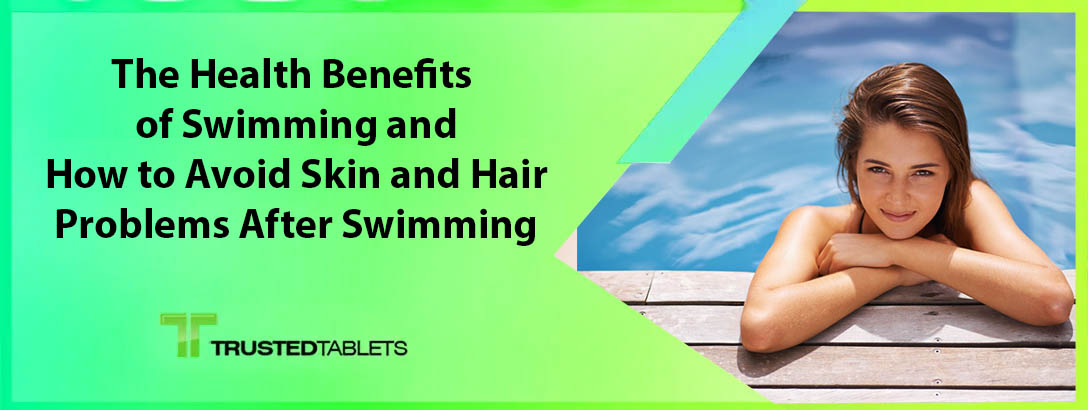Introduction to Swimming
Swimming is not only a popular recreational activity but also a beneficial exercise that offers numerous health advantages. However, exposure to pool chemicals and prolonged water contact can lead to skin and hair issues. In this article, we will explore the health benefits of swimming and effective ways to prevent skin and hair problems post-swimming.
1. Health Benefits of Swimming
Why Swimming Is Good for Your Health?
Swimming provides a full-body workout with minimal impact on joints, making it suitable for people of all ages and fitness levels. Key health benefits include:
- Cardiovascular Fitness: Improves heart and lung health.
- Muscle Strength: Tones muscles in the arms, legs, and core.
- Flexibility: Enhances flexibility and range of motion.
- Weight Management: Burns calories and promotes weight loss.
- Mental Well-being: Reduces stress and promotes relaxation.
Swimming as Therapy
Swimming is also used as therapy for various conditions, such as:
- Rehabilitation: Helps recover from injuries or surgeries.
- Arthritis: Eases joint pain and stiffness.
- Asthma: Improves lung function and breathing techniques.
2. Skin Problems After Swimming
Common Skin Issues
Exposure to pool chemicals like chlorine and bromine can cause skin problems such as:
- Dryness: Strips natural oils from the skin, leading to dryness and irritation.
- Rashes: Chemicals or bacteria in the water can cause allergic reactions or rashes.
- Acne: Prolonged exposure can exacerbate acne or skin breakouts.
How to Prevent Skin Problems?
To minimize skin issues after swimming, follow these tips:
- Shower Immediately: Rinse off chlorine or saltwater after swimming.
- Use Moisturizer: Apply a moisturizer to hydrate the skin post-swim.
- Wear Protective Gear: Use swim caps and goggles to protect hair and eyes.
- Choose Pools Wisely: Opt for pools with proper chemical balance and filtration.
3. Hair Problems After Swimming
Effects of Chlorine on Hair
Chlorine can have damaging effects on hair, including:
- Dryness: Strips natural oils, causing dry and brittle hair.
- Discoloration: Causes blonde hair to turn greenish.
- Breakage: Weakens hair strands, leading to breakage and split ends.
How to Protect Hair?
To maintain healthy hair after swimming, take these precautions:
- Wet Hair Before Swimming: Wetting hair with fresh water reduces chlorine absorption.
- Use Swim Caps: Protects hair from direct contact with pool water.
- Rinse Thoroughly: Rinse hair immediately after swimming to remove chlorine.
- Condition Regularly: Use a conditioner designed to combat chlorine damage.
4. Benefits of Saltwater Swimming Pools
Are Saltwater Pools Better?
Saltwater pools use salt chlorinators to sanitize water, offering benefits such as:
- Gentler on Skin and Hair: Lower chlorine levels reduce dryness and irritation.
- Natural Feel: Saltwater feels softer and more natural.
- Less Chemical Odor: Reduces the strong chemical smell associated with chlorine pools.
Considerations for Saltwater Pools
- Maintenance: Requires periodic adjustment of salt levels.
- Initial Cost: Higher upfront installation costs compared to traditional chlorine pools.
5. Post-Swimming Skincare Routine
Steps to Protect Your Skin and Hair
After swimming, follow these steps to maintain healthy skin and hair:
- Shower Immediately: Rinse off pool chemicals and bacteria.
- Use Moisturizer: Apply a hydrating lotion to lock in moisture.
- Hair Care: Use a clarifying shampoo to remove chlorine or salt buildup.
- Drink Water: Stay hydrated to replenish fluids lost during swimming.
6. DIY Remedies for Skin and Hair
Natural Treatments for Post-Swimming Care
Try these DIY remedies to soothe and repair skin and hair:
- Aloe Vera Gel: Calms irritated skin and promotes healing.
- Coconut Oil: Moisturizes and conditions hair after exposure to chlorine.
- Oatmeal Bath: Relieves itching and soothes sensitive skin.
- Apple Cider Vinegar Rinse: Neutralizes chlorine and restores hair pH balance.
7. Conclusion: Embracing the Benefits of Swimming
Swimming offers numerous health benefits, from cardiovascular fitness to stress relief. By taking proactive steps to protect your skin and hair, you can enjoy swimming while minimizing potential post-swimming issues. Incorporate proper skincare routines and consider swimming in saltwater pools for a gentler experience. Stay hydrated and use natural remedies to maintain healthy skin and hair year-round.
Table Summary of Swimming Benefits and Post-Swimming Care
| Health Benefits | Skin Care Tips | Hair Care Tips | DIY Remedies |
|---|---|---|---|
| Cardiovascular Fitness | Shower Immediately | Wet Hair Before Swimming | Aloe Vera Gel |
| Muscle Strength | Use Moisturizer | Use Swim Caps | Coconut Oil |
| Flexibility | Wear Protective Gear | Rinse Thoroughly | Oatmeal Bath |
| Weight Management | Choose Pools Wisely | Condition Regularly | Apple Cider Vinegar Rinse |
| Mental Well-being |
FAQ
1. Can swimming help with weight loss?
Yes, swimming burns calories and helps with weight management.
2. How often should I moisturize after swimming?
Moisturize immediately after swimming and as needed throughout the day to keep skin hydrated.
3. Can chlorine in pools cause acne?
Yes, chlorine can dry out the skin and exacerbate acne or skin breakouts.
4. Is swimming in saltwater pools better for skin and hair?
Saltwater pools are gentler on skin and hair due to lower chlorine levels and can provide a more natural swimming experience.
5. What should I do if I experience hair discoloration from chlorine?
Use a clarifying shampoo to remove chlorine buildup and restore hair color.
6. Can swimming aggravate skin conditions like eczema?
Yes, chlorinated water can irritate sensitive skin conditions like eczema. Consult with a dermatologist for recommendations on managing skin conditions while swimming.
7. How can I protect my eyes while swimming?
Wear goggles to protect your eyes from chlorine and other pool chemicals.


